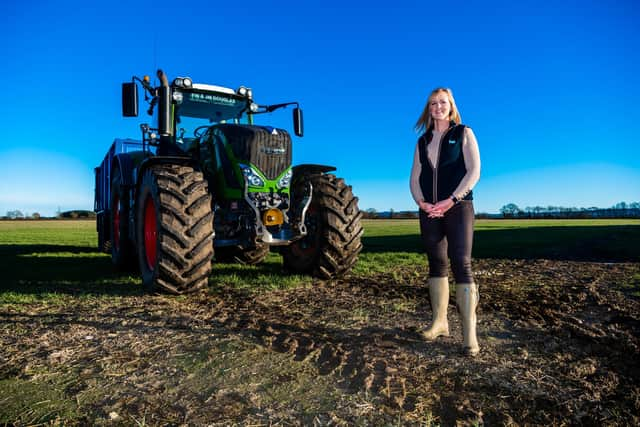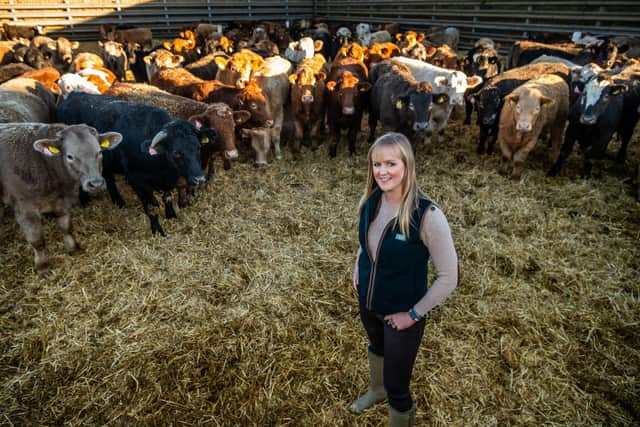Farm of the Week: The CLA north director from a Dales sheep farming family who wants to make a difference
Lucinda hails from Wensleydale where her parents have a sheep farming enterprise and lives with her husband Will in the Vale of Pickering at Rise Carr Farm in Marishes which combined with Wray House Farm next door is a vastly different farming model of arable and cattle.
“You couldn’t have two more distinctly different farming operations,” said Lucinda, whose role with the CLA is to support every type of landowner. “It gives me a really good first-hand perspective on how two very different types of farm businesses that have different opportunities and different challenges can face up to them and exemplifies what the CLA is all about.
Advertisement
Hide AdAdvertisement
Hide Ad“Will, his brother John and their father Michael (Mick) are all involved on the farm here which runs to 700 acres but with contract farmed land means they farm 1200 acres. John is full-time day-to-day; Will combines his time on the farm with being a land agent for Savills, which also leads to him being involved on the legislative side. There are three other men in the team.


“It is a mix of beef and arable. Mick handles all the cattle buying from livestock markets and at any one time we have between 700-900 cattle and finish around 3000 a year. They are all bought in at around 15-18 months old and will generally be on here for around three months.
“Cropping is a mix of wheat, barley, beans, oilseed rape, maize, fodder beet, rye grass and grass. It is productive heavy arable land. The clue is in the name Marishes, but that hasn’t stopped them taking on direct drilling which I didn’t think I’d see here because of the land type.
Lucinda said the benefits are already evident and not just in the soil.
Advertisement
Hide AdAdvertisement
Hide Ad“It is in everybody’s interest to look after the soil, but there’s also the cost savings made on diesel through direct drilling with the Horsch drill that have already seen a considerable reduction.


“Environmental land management, cover crops and margins are all part of the farming system at Rise Carr. We are in a mid-tier scheme.
“John, Will and Mick are constantly looking at opportunities to minimise input costs. One of our other ways has been in using the digestate off the anaerobic digestate (AD) plant we have here rather than buying as much fertiliser. The 500kw plant was put in about seven years ago as a joint venture agreement. The farm business is the operator of the plant with a joint venture capital company that has AD plants all over the country. We utilise digestate off the AD plant rather than buying as much fertiliser.
Lucinda said the farm’s commitment to reducing inputs, reducing its carbon footprint and lately reducing methane output was an example of how the farm is moving forward in the right way.
Advertisement
Hide AdAdvertisement
Hide Ad“We now feed the cattle a Harbro mineral that has been approved by the Scottish Agricultural College that reduces methane output.
It is a very different farming story where Lucinda grew up near Aygsgarth Falls.
“It’s not like Marishes. It is a sheep farm in the Yorkshire Dales National Park where it is farmed as efficiently as possible with 500 breeding ewes on an extensive system and provides a public good as we have a number of footpaths across the farm.
“Essentially all farmers get into farming because they want to farm, but in the national parks and other areas the move from government has been that farmers should be paid for providing other goods and services like keeping walls up and in good condition.
Advertisement
Hide AdAdvertisement
Hide Ad“One of the problems is that although we know there’s something coming to compensate farmers for that, it will never compensate for the true costs of keeping barns up, walls up, feeding the nation, keeping livestock and farming in such a way that it is sensitive to the environment.
“Farmers have always been, in addition to being farmers, custodians of the environment. Wensleydale wouldn’t look like it is without being a managed landscape. That’s why farmers get frustrated. They want to farm and they keep things right for the public, in offering home-produced food and keeping the countryside in the right way.
Lucinda’s personal and business experiences of farming through her previous work with land agents, the NFU and now the CLA mean that she is well aware of the pressures facing all farmers and landowners today.
“There is much uncertainty in every walk of life, and that is currently really acute in farming and rural landownership because of the uncertainties in the reductions of BPS. We’ve still not had enough information regards what the new schemes are going to be going forward.
Advertisement
Hide AdAdvertisement
Hide Ad“We know about such as the Sustainable Farming Incentive (SFI) but in such as countryside stewardship and other initiatives we are still short on detail. There’s a lot of information missing, including what payment rate options are going to be available.
“It all means the ability to plan is limited. That is one of the fundamental things we are conscious of and I’m really trying to push Defra to make announcements as soon as possible.
Lucinda doesn’t believe that changes in government are any excuse for delays in farm and land considerations or the rural economy generally.
“It doesn’t wash with me that people are ‘still getting the handle on the job’.
Advertisement
Hide AdAdvertisement
Hide Ad“The other key thing we have been working on has been the Levelling Up report. Levelling up is not just about north versus south, it’s also about rural versus urban. Rural should get its fair share otherwise rural communities are going to be left behind. An all-parliamentary group report made 27 recommendations to government last year about what it can do to kickstart the rural economy.
“Lack of affordable rural housing, schools and local services and assistance through planning policies that support diversification are all areas that need addressing.
“I’m not saying diversification is always the answer but the opportunities to do things differently and better connectivity needs to be available. There’s a lot that needs driving forward and our job at the CLA is to do what we can to help drive that through.
“It’s up to us to hold the government and all politicians to account. We are very mindful that the next General Election will be held within the next two years and that we need to make sure we are relevant and at the forefront of whoever ends up in power.
Advertisement
Hide AdAdvertisement
Hide AdLucinda is very much a Yorkshire woman, but once found herself representing Lancashire at young farmers’ level.
“I was studying at Harper Adams lived in the Ribble Valley in my placement year. I joined Clitheroe YFC. I’d never done stockjudging and didn’t have a clue but ended up coming top and representing Lancashire at the stockman Of The year competition in the north. I got found out pretty quickly at that level.